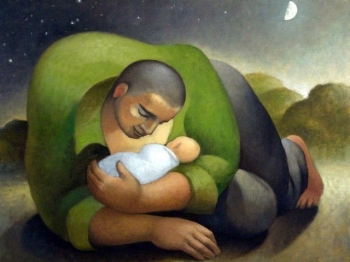“The Spirit upsets plans”
 “O blessed Joseph, be a father to us, too, and lead us on the path of life.
Obtain for us grace, mercy, and courage, and defend us from all evil.
Amen”. (Margarita Sikorskaia, painting on fatherhood).
“O blessed Joseph, be a father to us, too, and lead us on the path of life.
Obtain for us grace, mercy, and courage, and defend us from all evil.
Amen”. (Margarita Sikorskaia, painting on fatherhood).
The Latin Patriarch of Jerusalem talks to us about Saint Joseph in this meditation which he agreed to write especially for the Knights and Dames of the Order.
Saint Joseph, the husband of Mary and the putative father of Jesus, is mistakenly considered the unknown among the saints. Yet, in their magisterium the popes ceaselessly referred to this great biblical figure. Pius IX, to mention just the latest popes, declared him Patron of the Church, with the bull Quemadmodum Deus (1870). Indeed, it was in recognition of the anniversary of this bull that Pope Francis declared the year dedicated to Saint Joseph on 8 December last. Saint John Paul II in 1989, published Redemptoris Custos, on the occasion of the centenary of a previous encyclical, also dedicated to Saint Joseph, by Pope Leo XIII, entitled Quamquam pluries. St. Pius X also wrote about the “unknown” spouse of the Virgin, as did so many others. In other words, the list is long.
It is, in fact, a great figure of the New Testament. It is true that we have few passages referring directly to him, in the so-called childhood gospels, but those few passages are full of information and also of biblical references to the Old Testament.
The Gospel according to Matthew most widely presents the various moments in Joseph’s life. I would like to single out one particular aspect of this precious figure. Joseph is a person who has been called.
This vocation is the gift from the Lord to take part in His plan of salvation. It is the place that everyone has in history that God manifests with His people. First of all, God calls Mary, and she answers with her yes, and thus the Lord’s plan advances a step.
Joseph is faced with these unexpected events, and he does not enter them, he does not take them on as his, until he is called to do it, he does not enter until it is the Lord who introduces him. No one can enter the mystery of God except through the door of one’s own vocation, except in the way that God chooses. And the same happens for Joseph, who remains outside the complex and incredible story of Mary, until he understands that God is calling him to enter it. Then he obeys immediately and, like Mary, he says yes to the Lord.
Mary is called to nurture the Son of God in her womb, to be Mother of the Lord. But what is Joseph called to?
In the Gospel of Matthew, there are three episodes in which Joseph is spoken of. The first apparition in a dream (Mt 1:18 et seq.), the flight into Egypt (Mt 2:13 et seq.) and the return from Egypt (Mt 2:19 et seq.).
There is an almost identical expression that recurs in each of these three passages: “Joseph, take it with you.” This is what the angel repeats every time he meets Joseph, every time he calls him to give him a task, he always tells him the same thing: “take the child and his mother.” The angel explains to him that what happened is the work of the Holy Spirit.
In each of these three passages, Matthew reports that Joseph, awakened from sleep, obeys the command received, and takes the child and his mother with him. He says nothing, he does nothing but he takes them with him. The vocation is to take upon oneself, to assume and to do precisely what God works, what the Spirit works. It is not doing something.
The vocation is not our work, but it is the leap that makes us move from our work to His work, in us and for us. It is taking with us, within our life, God’s plan, it is living from this. Joseph is this docile man, capable of putting aside his own ideas, his own projects, even if they are just projects, even if they are obedient to the Law of God, and he opens himself to God’s plan and His newness. He is the courageous man, who when he is sure that what happens comes from God, he puts himself on the line, and accepts all the consequences, even the insecurity that comes from such a situation.
Usually the Spirit upsets the plans and takes us where we don’t think we should go. The Spirit knows other measures, other ways, which we do not always understand. What will Joseph have understood of the angel’s speech? Probably not much, but he understood the essential thing, namely that what was happening was the work of God. And, trusting, he welcomed life and welcomed Jesus.
The Spirit fulfils the life of Jesus in us: forgiveness, acceptance, gift, gratuitousness, love.
Redemption, this great project of God, passed through Mary’s yes and Joseph’s obedience. Confident, silent, active obedience. It is an important lesson from the school of Nazareth, from which we want to begin anew today.
Archbishop Pierbattista Pizzaballa
Latin Patriarch of Jerusalem
(May 1, 2021)



